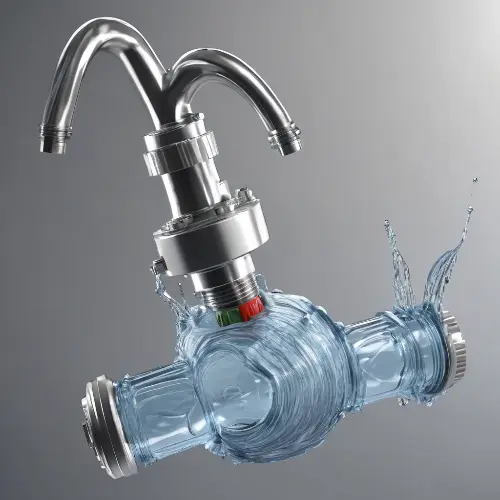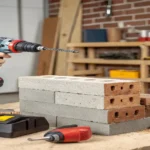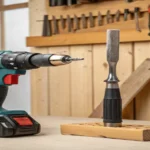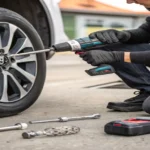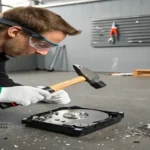Can Water Hammer Damage Pipes? What You Need to Know
Water hammer is caused by a hydraulic shock in the piping of any appliance, in a house when pipes bang loudly and can lead to pipe damage. In this entire article on water hammer noise, you will get to know the causes, dangers, and prevention of water hammer.
The main cause of the water hammer is due to the momentum of the moving water in the pipe suddenly being forced to stop or change direction. This causes the shock wave and the pipe to sound like banging.
The shock waves travel through the pipe at a speed of 22 times more than the traveling roaring sound. The dangerous effects of water hammer include undue stress on the pipes, if not prevented could lead to a leak, burst, etc.
What Causes Water Hammer?
If you cause a quick change in water pressure or water direction, a water hammer will happen. Here are some of the most common reasons for a water hammer:
- Quickly turning on or off water will happen when you instantly turn off a faucet or flush a toilet. The flow of water is quickly closed, causing the pipes to shake from the change in pressure.
- Closing valves too quickly – Valves like washing machine hoses and dishwasher valves can cause water hammer if closed too quickly. The water has no time to slow down gradually.
- Pump issues – Faulty pumps that turn on and off frequently can lead to repetitive water hammer. The rapid changes in water flow lead to constant hydraulic shock.
- Undersized pipes – Narrow pipes increase water velocity. This makes water hammer more likely when the flow is disrupted.
- Trapped air – Air bubbles in the pipes can get compressed by moving water. When the bubbles are suddenly released, they can cause water hammer.
- Loose pipes – The louder and more violent the shaking of the pipes when the hammer of the water occurs. If there are pipes that are not loose and move, they are secured and are less likely to leak or burst as well.
Dangers of Water Hammer: Can It Damage Pipes?
A water hammer can damage your home’s pipes and plumbing system. Here are some of the most common dangers:
- Burst pipes – The intense pressure can cause weak spots in pipes to rupture and leak. Plastic pipes are at high risk.
- Leaking joints – The joints connecting pipes may leak after being stressed from water hammer vibrations.
- Noisy pipes – The loud banging noises point to excessive wear and tear on your pipes. The impacts weaken pipes over time.
- Malfunctioning appliances – Dishwashers, washing machines, and other appliances can malfunction or leak if a water hammer damages connected hoses and valves.
- Higher water bills – Leaks caused by water hammer will show up on your water bill. Damaged pipes lose water even when you are not using them.
- Flooding – Severe water hammer can crack pipes and cause major flooding if leaks are not addressed quickly. The water damage can be extremely expensive to repair.
How to Prevent Water Hammer Damage
The ways you can prevent water hammer or minimize the damage are:
- Install water hammer arrestors – these are special kinds of valves that have shock waves and prevent them from traveling through pipes.
- Use flexible hoses – Flexible water supply lines will simply vibrate and absorb the shock rather than transmitting it to rigid pipes. They help reduce the banging noise.
- Slowly close fixtures and valves – Avoiding abrupt water flow changes prevents shock waves. Turn off fixtures and valves gradually rather than all at once.
- Bleed-trapped air from pipes – This can be done by opening taps to let air escape. Trapped air pockets that can contribute to water hammer are reduced.
- Insulate pipes – Pipe insulation limits excessive movement and dampens noise if water hammer does occur. Securing pipes also helps minimize vibrations.
- Install pressure regulator – Maintaining steady, moderate water pressure in the system leaves less room for dramatic pressure spikes that lead to a water hammer.
- Call a plumber – For severe or persistent water hammer, call in a professional plumber. They can diagnose the underlying cause and prescribe solutions.
FAQs About Water Hammer
What does a water hammer sound like?
Water hammer causes a loud banging, hammering, or thumping sound coming from your pipes. It often sounds like a hammer striking a pipe from the inside. The noise usually lasts a few seconds and occurs whenever a fixture is opened or closed.
Where does water hammer occur most?
Water hammer typically happens at quick-closing fixtures like washing machines and dishwashers. Long vertical pipes leading to upstairs bathrooms are also common sites as moving water has farther to fall back down.
Is water hammer dangerous for PEX pipes?
A water hammer puts intense stress on any pipe material. However, flexible PEX tubing is better able to withstand sudden pressure changes compared to rigid copper or PVC pipe. Still, it’s best to mitigate water hammer regardless of your pipe type.
Should I be concerned about a little water hammer noise?
It’s generally wise to address water hammer sounds right away before they lead to pipe damage. The banging may be tolerable at first but will weaken pipes over time. A minor repair now prevents major flooding disasters down the road.
Does water hammer damage water heaters?
The surge of pressure from the water hammer can push into and damage water heater tanks. The sudden shifts in pressure can also cause temperature fluctuations that lead to cracks in the heat exchanger. Checking heaters for leaks after water hammer events is recommended.
The Bottom Line
Unresolved water hammer puts unnecessary strain on pipes and plumbing fixtures. While a little noise may seem harmless, the repeated hydraulic shock can cause leaks, floods, and damage over time.
Addressing the underlying causes and installing water hammer arrestors is key. With proper precautions, you can help prevent costly pipe repairs down the road.

I’m Ian Welkins, a seasoned professional in the tools industry. My passion drives me to share valuable insights on hammers, drills, and industrial tools. With years of experience, I’m your trusted source for expert advice on the best tools for every job.
